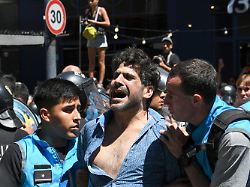Clashes in Argentina
Thousands are protesting against Milei’s deregulation course
December 28, 2023, 4:49 a.m
Argentina’s new president is in a hurry to implement his libertarian agenda. He uses an emergency decree to suspend numerous laws and regulations. Many Argentines fear for the separation of powers in the country, and there are renewed protests against Milei’s plans in Buenos Aires.
Thousands of people took to the streets in Argentina to protest against the drastic economic reforms of their new President Javier Milei. In the capital Buenos Aires, demonstrators called on the judiciary to invalidate a decree for comprehensive economic deregulation. Numerous people wave the Argentine flag and posters saying “The homeland is not for sale.”
“We do not question the legitimacy of President Milei, but we want him to respect the separation of powers,” emphasized the head of the construction union, Gerardo Martínez. After the demonstration ended, individual groups clashed with the police. According to media reports, seven people were arrested. The government recently tightened the right to demonstrate; anyone who blocks the street will have their social benefits cut off.
The decree introduced by right-wing populist Milei envisages changing or abolishing 350 existing laws, including tenancy and labor law. Other aspects include the end of automatic pension increases, the elimination of some worker protection regulations and the repeal of laws protecting against abusive price increases. In order to reduce government spending, 7,000 public sector jobs are to be cut.
Consent is a formality
Milei introduced the legal changes before Christmas by emergency decree and declared a two-year public emergency. Lawyers classify the procedure as unconstitutional. In order for the decree to come into force on Friday, it must go through review by both chambers of Congress. Milei’s radical right-wing party La Libertad Avanza is in the minority in both chambers, with just 40 of 257 representatives and seven of 72 senators. However, both the House of Representatives and the Senate would have to reject the decree in order to block the reforms.
Milei, who was elected in November, promised the heavily indebted country the prospect of “shock therapy” when he took office on December 10th. The 53-year-old political newcomer took over Latin America’s third-largest economy in the midst of a severe economic crisis: Inflation has risen to more than 160 percent and more than 40 percent of the population lives in poverty. Shortly after the decree was announced, Milei announced that this would only be the beginning of his plans.
